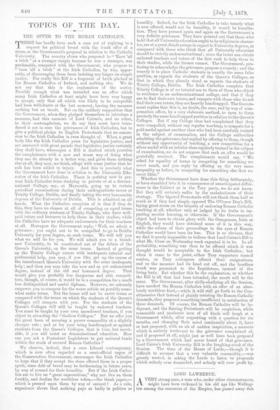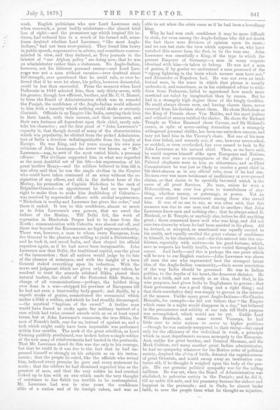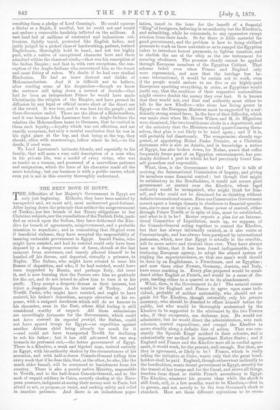LORD LAWRENCE.
AVERY strong man, a man who, under other circumstances, might have been reckoned in his old age like Welling- ton among the resources of the Empire, has passed away this
week. English politicians who saw Lord Lawrence only when overwork, a great bodily misfortune—the almost total loss of sight—and the premature age which tropical life in- duces, had reduced him to a wreck of his former self, some- . times doubted whether Lord Lawrence, "like most Anglo- .. Indians," had not been over-praised. They found him heavy
in public speech, unpersuasive in advice, and sometimes narrow- minded in view, and they declared, as Tory journals in the interest of " our Afghan policy " are doing now, that he was an administrator rather than a statesman. No Anglo-Indian, however, not his bitterest personal enemy—and Lord Law- re we was not a man without enemies—ever doubted about hie strength, ever questioned that he could rule, or ever be- lieved that if he were let alone, his policy, however distasteful, could be less than successful. From the moment when Lord Dalhousie in 1848 selected him, then only thirty-seven, with his greater, though less efficient, brother, and Mr. C. G. Manse], to form the Board of Administration which was to remodel the Punjab, the confidence of the Anglo-Indian world adhered to him with a tenacity which nothing could shake or seriously diminish. Officials in an Empire like India, carrying their lives in their hands, with their success, and their measures, and their own fortunes all dependent upon their chief, rarely mis- take his character ; and the first proof of " John Lawrence's " capacity is, that though devoid of many of the characteristics which win popularity, he elicited from the picked Administra- tors of India a devotion indistinguishable from the loyalty of Europe. He was King, and for years among his own men criticism of John Lawrence—he never was known as " Mr." Lawrence—was, to men of the most varied kinds, a personal offence. The civilians supported him in what was regarded as the most doubtful act of his life—his supersession of his great brother Henry—and the soldiers believed in him till it was often said that he was the single civilian in the Empire who could have taken command of an army without the re- signation of any officer, and till, in the darkest hour of the Mutiny, his promotion of Captain Nicholson to the rank of Brigadier-General—an appointment he had no more legal right to make than to make him Archbishop of Calcutta— was received by superseded officers with cordial acquiescence. "Nicholson is worthy and Lawrence has given the order," and there it ended. It was to this confidence, almost as much as to John Lawrence's own powers, that we owed the failure of the Mutiny. Till Delhi fell, the work of repression in Hindostan Proper had to be done from the North ; communication with Calcutta was almost cut off, and there was beyond the Kurumnassa no legal supreme authority. There was, however, a man to whom every European, from the General to the planter, was willing to yield a Dictatorship; and he took it, and saved India, and then obeyed his official superiors "again, as if he had never been irresponsible. John Lawrence saw that Delhi, the traditional capital, was the pivot of the insurrection ; that all natives would judge by its fate of the chances of resistance, and with the insight of a born General staked everything upon its reduction. With the nerve and judgment which are given only to great rulers, he resolved to trust the scarcely subdued Sikhs, placed their natural leaders, the chiefs of the Protected Sikh States, in charge of all communications—perhaps, the boldest thing ever done in a war—stripped his province of Europeans till he had not even a trustworthy body-guard ; and finally, by a superb stroke of genius, resanctioned the ceremonial which makes a Sikh a soldier, and which he had steadily discouraged, —the mystical "baptism of the sword." A feebler man would have feared to evoke again the military instinct of a race which had twice crossed swords with us on at least equal terms, but at John Lawrence's summons, the true Sikhs, the men of Nanuk's faith, rose for us, instead of against us, and a task which might easily have been impossible was performed within four months. The neck of the great rebellion, as Lord Canning publicly proclaimed, was broken before a single soldier of the new army of reinforcements had landed in the peninsula. That Mr. Lawrence dared do this was due only to his courage, but that he could do it was duo to the fact that he had im- pressed himself as strongly on his subjects as on his instru- ments ; that the people ho ruled, like the officials who served him, believed every promise he gave and every statement ho made ; that the soldiers he had dismissed regarded him as the greatest of men, and that the very nobles he had crushed looked up to him with an awe which made the very thought of resistance to Jan Sahib too terrible to be contemplated. Mr. Lawrence had won in nine years the confidence alike of a nation and of its foreign rulers, and was as
able to act when the crisis came as if he had been a hereditary king.
Why he had won such confidence it may be more difficult to state, for even among the Anglo-Indians who did not doubt the fact there were divisions of opinion upon its cause ; and we can but state the view which appears to us, who have watched this career from the first, to be the true one. John Lawrence was essentially a King, of the typo to which the present Emperor of Germany—a man in many respects identical with him—is taken to belong. He was not a man of genius, if by genius we understand a man possessed of the " zigzag lightning in the brain which meaner men have not," and Alexander or Napoleon had. He was not even an intel- lectual man, in the sense in which that phrase is usually understoc,d, and sometimes, as in his celebrated advice to with- draw from Peshawur, failed to apprehend how much more mankind are ruled by imagination than by reason. But he had in a strangely high degree three of the kingly faculties. He could always choose men, and having chosen them, never swerved from his decision about them. He chose Nicholson as the King of Prussia chose Von Moltke, and the most jealous and critical of armies ratified the choice. He chose Sir Richard Temple as Victor Emanuel chose Cavour, and Sir Richard's career, in spite of never-ending detraction and a strangely widespread personal dislike, has been one unbroken success, and may yet land him in the Viceroy's chair. Not one of his men has ever failed, and scarcely one, if one, however overworked, or scolded, or even overlooked, has ever ceased to look to Sir John Lawrence as his natural chief. Then, as we have said, he could impress himself alike upon Europeans and Natives. No man ever was so contemptuous of the glitter of power. Painted elephants were to him an abhorrence, and as Chief Commissioner he was just as likely to receive a great chief in his shirt-sleeves as in any official robe, even if he had one. No man over was more intolerant of inefficiency or over-pressed claims, or that desire to be specially favoured which is the curse of all great Services. No man, unless he were a Hohenzollern, was over less given to wastefulness of any- thing, whether money, or patronage, or power. Yet no man ever stirred less resentment among those who served him. It was of no use to say, as was often said, that this measure was due to one man and that to another; that John Lawrence knew men and nothing else ; that he always asked D. Macleod, or R. Temple, or anybody else, before he did anything great ; those concerned knew well who was king, and did not care two straws by whom he had been assisted in his plans. All he devised, or accepted, or sanctioned was equally carried to his credit, and equally swelled the great volume of confidence in himself, in his character, and—for this entered into the con- fidence, especially with natives—in his good-fortune, which, save as respects his bodily health, never varied throughout his. career. And lastly—and this is perhaps the one point which will be new to our English readers—John Lawrence was above all men the one who represented best the strongest latent idea of the Anglo-Indian community,—their secret conviction. of the way India should be governed. He was in Indian politics, to the depths of his heart, the democrat dictator. He hold as a faith, and not merely as an idea, that God, in his wise purposes, had given India to Englishmen to govern ; that their government was a good thing and a right thing ; and that their correlative duty was simply to govern in the interest of the masses. Unlike many great Anglo-Indians—Sir Charles Metcalfe, for example—he did not believe that " the Empire which came in a night would disappear in a day," but believed in the permanence and solidity of our rule till God's purpose was accomplished, which would not be yet. Unlike Lord William Bentinck, and some recent Viceroys, he had little care to raise natives en masse to higher positions —though he was entirely unopposed to their rising—but eared only for the efficiency of the individual in work, a principle which in most departments secures monopoly to the European. And, unlike his great brother, and General Sleeman, and Sir Mark Cubbon, and many another great Indian administrator, he had no sympathy whatever for the Native order of 'political society, despised the cleira of birth, detested the capriciousness of great Orientals, and would sweep away an institution cen- turies old, if he thought it weighed upon the body of the peo- ple. His one genuine political sympathy was for the toiling millions. He was set, when the Board of Administration was abolished, to pulverise society in the Punjab ; and he did it, till no noble felt safe, and his peasantry became the richest and happiest in the peninsula ; and in Oude, he almost broke faith, to save the people from what he thought an injustice,
resulting from a pledge of Lord Canning's. He could squeeze a Sirdar or a Rajah, if needful, but he could not and would not endure a removable hardship inflicted on the millions. A vast land full of millions of contented and industrious cul- tivators, lightly taxed, protected like English ladies, and justly judged by a picked class of hardworking, patient, trained Englishmen, thoroughly held in hand, and not too highly paid, with a native of exceptional character here and there admitted within the charmed circle,—that was his conception of the Indian Empire ; and that is, with rare exceptions, the con- ception of the Anglo-Indians who reverenced him as the truest and most fitting of rulers. We doubt if he Bad ever studied Hindooism. He had an inner distrust and dislike of Mahommedanism. And it is difficult not to believe, after reading some of his despatches—though we know the sentence will bring down a torrent of denials—that had he been an independent Prince he would have made Christianity the religion of the Empire, and have pressed its diffusion by any legal or official means short of the direct use of the sword. It was true, and it was best for the people ; and there discussion ended. Those are the ideas of a Hohenzollern, and it was because John Lawrence bore to Anglo-Indians the relation the Hohenzollern bears to Germans, that he excited in them such loyalty,—loyalty which was not affection, and not exactly reverence, but only a mental conclusion that he was in his right place at the top, and that being at the top, they should, often with murmurings, follow where he led,—to the death, if need were.
To Lord Lawrence's intimate friends, and especially to his family, that will seem a very cold description of a man who, in his private life, was a model of every virtue, who was as tender as a woman, and possessed of a marvellous patience and resignation, which the force of his character made all the more touching ; but our business is with •a public career, which even yet is not in this country thoroughly understood.




































 Previous page
Previous page